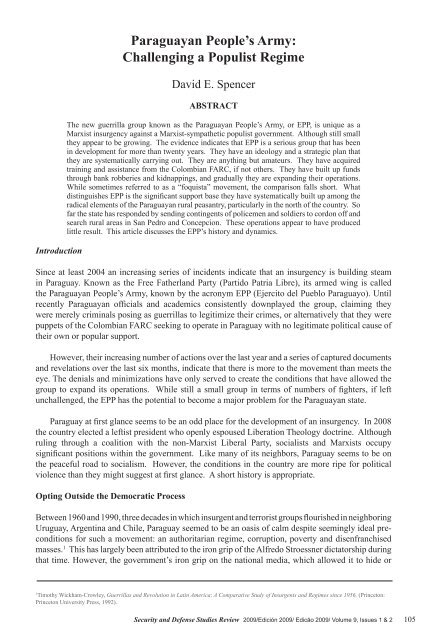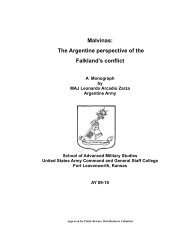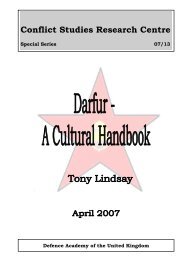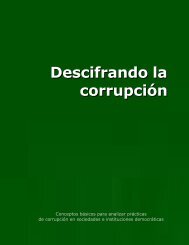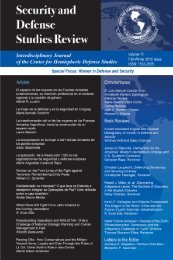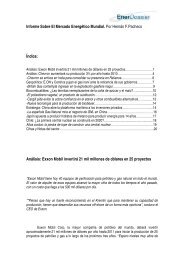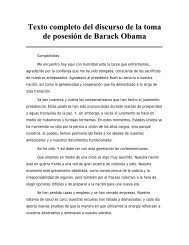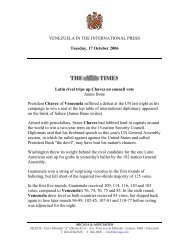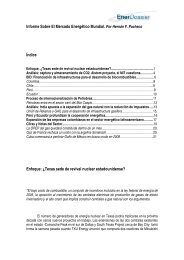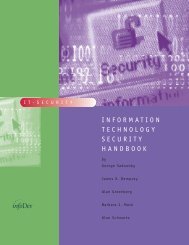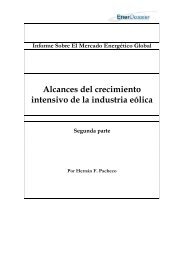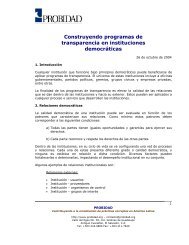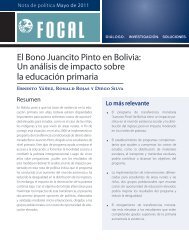Security and Defense Studies Review - Offnews.info
Security and Defense Studies Review - Offnews.info
Security and Defense Studies Review - Offnews.info
Create successful ePaper yourself
Turn your PDF publications into a flip-book with our unique Google optimized e-Paper software.
IntroductionParaguayan People’s Army:Challenging a Populist RegimeDavid E. SpencerABSTRACTThe new guerrilla group known as the Paraguayan People’s Army, or EPP, is unique as aMarxist insurgency against a Marxist-sympathetic populist government. Although still smallthey appear to be growing. The evidence indicates that EPP is a serious group that has beenin development for more than twenty years. They have an ideology <strong>and</strong> a strategic plan thatthey are systematically carrying out. They are anything but amateurs. They have acquiredtraining <strong>and</strong> assistance from the Colombian FARC, if not others. They have built up fundsthrough bank robberies <strong>and</strong> kidnappings, <strong>and</strong> gradually they are exp<strong>and</strong>ing their operations.While sometimes referred to as a “foquista” movement, the comparison falls short. Whatdistinguishes EPP is the significant support base they have systematically built up among theradical elements of the Paraguayan rural peasantry, particularly in the north of the country. Sofar the state has responded by sending contingents of policemen <strong>and</strong> soldiers to cordon off <strong>and</strong>search rural areas in San Pedro <strong>and</strong> Concepcion. These operations appear to have producedlittle result. This article discusses the EPP’s history <strong>and</strong> dynamics.Since at least 2004 an increasing series of incidents indicate that an insurgency is building steamin Paraguay. Known as the Free Fatherl<strong>and</strong> Party (Partido Patria Libre), its armed wing is calledthe Paraguayan People’s Army, known by the acronym EPP (Ejercito del Pueblo Paraguayo). Untilrecently Paraguayan officials <strong>and</strong> academics consistently downplayed the group, claiming theywere merely criminals posing as guerrillas to legitimize their crimes, or alternatively that they werepuppets of the Colombian FARC seeking to operate in Paraguay with no legitimate political cause oftheir own or popular support.However, their increasing number of actions over the last year <strong>and</strong> a series of captured documents<strong>and</strong> revelations over the last six months, indicate that there is more to the movement than meets theeye. The denials <strong>and</strong> minimizations have only served to create the conditions that have allowed thegroup to exp<strong>and</strong> its operations. While still a small group in terms of numbers of fighters, if leftunchallenged, the EPP has the potential to become a major problem for the Paraguayan state.Paraguay at first glance seems to be an odd place for the development of an insurgency. In 2008the country elected a leftist president who openly espoused Liberation Theology doctrine. Althoughruling through a coalition with the non-Marxist Liberal Party, socialists <strong>and</strong> Marxists occupysignificant positions within the government. Like many of its neighbors, Paraguay seems to be onthe peaceful road to socialism. However, the conditions in the country are more ripe for politicalviolence than they might suggest at first glance. A short history is appropriate.Opting Outside the Democratic ProcessBetween 1960 <strong>and</strong> 1990, three decades in which insurgent <strong>and</strong> terrorist groups flourished in neighboringUruguay, Argentina <strong>and</strong> Chile, Paraguay seemed to be an oasis of calm despite seemingly ideal preconditionsfor such a movement: an authoritarian regime, corruption, poverty <strong>and</strong> disenfranchisedmasses. 1 This has largely been attributed to the iron grip of the Alfredo Stroessner dictatorship duringthat time. However, the government’s iron grip on the national media, which allowed it to hide or1Timothy Wickham-Crowley, Guerrillas <strong>and</strong> Revolution in Latin America: A Comparative Study of Insurgents <strong>and</strong> Regimes since 1956, (Princeton:Princeton University Press, 1992).<strong>Security</strong> <strong>and</strong> <strong>Defense</strong> <strong>Studies</strong> <strong>Review</strong> 2009/Edición 2009/ Edicão 2009/ Volume 9, Issues 1 & 2 105


